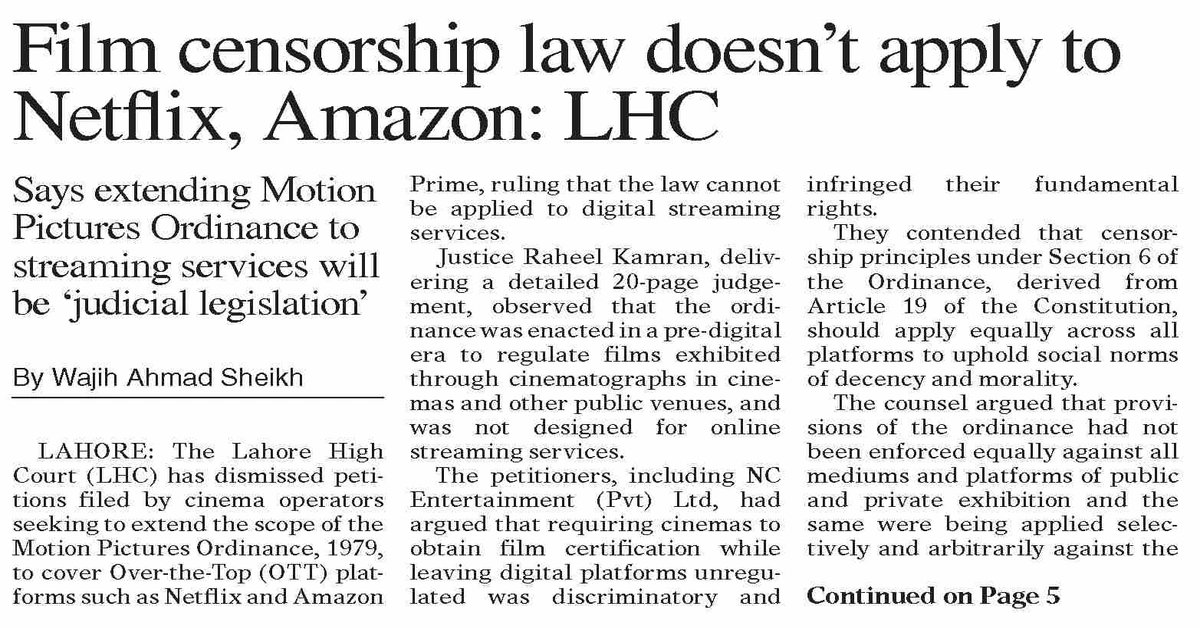The Lahore High Court (LHC) has dismissed petitions seeking to apply Pakistan’s Motion Pictures Ordinance to streaming platforms, ruling that traditional film censorship laws do not cover global OTT services such as Netflix and Amazon Prime. The judgment stresses that any change must come from legislation, not judicial extension of a 1979 law.
Scope of the Motion Pictures Ordinance
The Lahore High Court found that the 1979 Motion Pictures Ordinance and Censor Board rules were written for theatrical film releases, not for internet-based streaming services. The court highlighted that laws made for cinema screenings cannot be stretched to regulate global platforms like Netflix and Amazon Prime.
This interpretation limits the immediate application of Film Censorship Laws over OTT services. The judgment keeps online platforms outside the direct scope of cinema censorship rules.
The bench noted that petitioners wanted the court to expand an old statute beyond its original purpose. The LHC refused, making it clear that only the legislature or a properly empowered authority can bring new digital regulations.
Court Ruling
The LHC stressed that courts cannot re-write laws to cover mediums that were never envisioned when they were enacted. Applying cinema-specific censorship rules to streaming platforms would be legally inappropriate without fresh legislation.
By dismissing the petition, the court left online content regulation to Parliament or relevant authorities. Any new rules for digital platforms must come through proper lawmaking rather than judicial extension of the Motion Pictures Ordinance.
Impact on Streaming Platforms
For global platforms such as Netflix and Amazon Prime Video, the ruling means they cannot be forced into the same censoring process used for cinema films — at least not under the 1979 ordinance. This ensures that streaming services continue to operate without cinema-style restrictions for now.
For viewers, the decision reduces the immediate risk of blanket takedowns or pre-screening of content under the Motion Pictures Ordinance. Regulators, on the other hand, are prompted to draft tailored rules or seek parliamentary approval if stricter oversight is needed.
Practical Effects
Streaming platforms are still subject to existing online laws, such as telecom regulations and intermediary rules. Authorities can issue takedown orders in cases involving national security, hate speech, or other prohibited material.
The LHC ruling does not grant blanket immunity. Instead, it clarifies that cinema censorship procedures cannot be automatically applied to online platforms.
Join WhatsApp Channel For more Updates: PK Entertainment
Broader Legal Context
This judgment is narrow in scope. It does not decide whether OTT regulation is desirable, only that current Film Censorship Laws cannot be stretched to cover streaming platforms. Any move toward tighter control would require new legislation or regulations with a clear legal mandate.
The ruling creates a sharper legal boundary: what applies to theaters may not apply to online services without specific laws.
What Stakeholders Should Watch Next
- Legislative moves: Parliament could introduce amendments or draft a new digital-media code.
- Regulatory steps: Bodies like the Ministry of Information or PTA may issue clarifications or interim rules.
- Industry response: Platforms and distributors are expected to closely monitor upcoming policy shifts.
Also Read: How the One Piece Pirate Flag Became Gen Z Global Symbol of Rebellion
Future of Content Regulation in Pakistan
This decision may trigger wider debate on digital freedom, regulation, and content control in Pakistan. Lawmakers now face the challenge of balancing free expression with regulatory oversight in the age of streaming.
Any comprehensive policy must address technological realities, enforcement capacity, and international licensing frameworks to be effective.
Final thoughts
The LHC ruling sets a legal boundary: Film Censorship Laws designed for cinema do not automatically apply to OTT services like Netflix and Amazon Prime. The decision preserves the current status quo but signals that broader digital regulation must come from Parliament or empowered authorities.




Join The Discussion